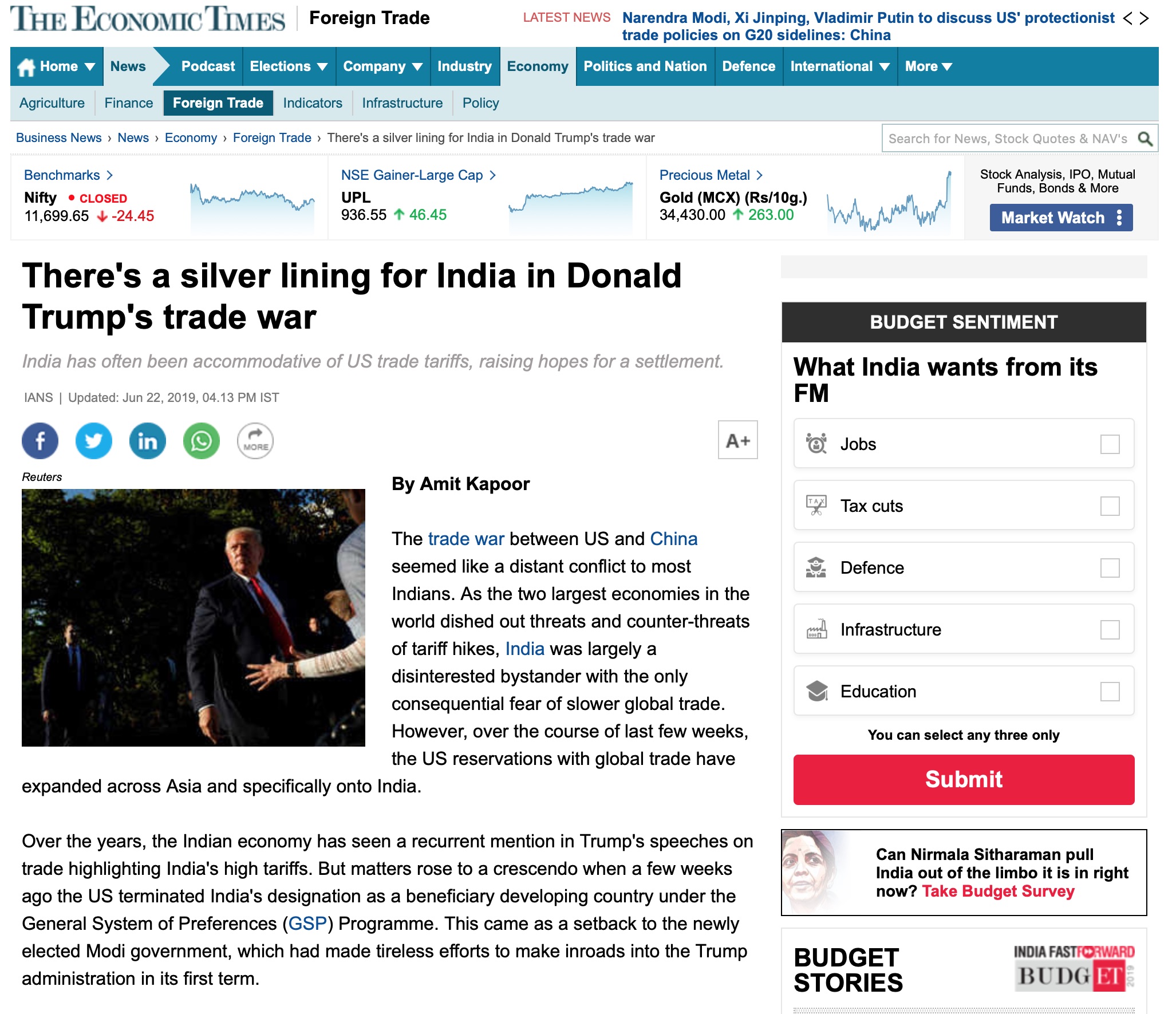Exploring the Determinants of Olympic Success
By Amit Kapoor
The buzz around the ongoing Paris Olympics is palpable. Powerful visuals showing the exhilaration of victory and heartbreak of near misses, elicits interest and deep emotions from players and viewers alike. A seasoned Olympic viewer would know that certain nations are known to excel in particular sports – such as China in Table Tennis, Great Britain in Cycling, USA in Basketball, and South Korea in Archery. When it comes to tallying total medal count at the end of the Olympic games, one is bound to ask: Why do certain countries fare better than others on the total medal count front? Discussions centered on the subject, more often than not, attribute wins and losses to individual players’ abilities, training, and dedication. While these factors are undoubtedly crucial, given the significance of sports achievement in these games, should we not delve into other determinants that can possibly have an impact on a nation’s sports prowess. One such factor is economic prosperity. Various studies have explored the linkage between a countries’ level of economic growth and performance in the Olympic games. In each of the last three Olympic Games (Summer & Winter), the top ten countries ranked by the total medal count are high income countries based on World Bank’s income level classifications, with the exception of China (upper middle income) in Tokyo 2020 Olympics and OAR (Olympic Athletes from Russia – upper middle income) in PyeongChang 2018 Olympics. However, research has found a range of determinants, beyond economic prosperity, including the team size, growth rate, expenditure on health, population and growth rate to have a significant impact on a nation’s Olympic performance. In our exploration, we investigated the association between the total medal count for each country at the Beijing 2022 Olympics and GDP per capita (PPP).

Moderate Positive Correlation between GDP per capita (PPP) and Total Medal Count for each Country at the Beijing 2022 Olympics
Data source: World Bank for GDP per capita figures; Paris Olympics Website for Medal Count
When analyzing the correlation between economic prosperity and Olympic success, as measured by the aforementioned indicators, a moderate positive relationship is observed with a correlation coefficient of 0.62. While this indicates a positive linkage between the two parameters, it is important to note that correlation does not imply causation. Economic resources can potentially affect sports prowess, however, it is not a strong sole determining indicator. To fully understand what drives Olympic success or overall sports prowess of a nation, there are a host of indicators to be looked at.
The correlation between a country’s population and its Olympic medal count has also sparked widespread interest. Intuitively, the assumption is that a larger country would have a greater pool of talent and hence the possibility of a higher medal count. The reality however is more nuanced. To understand Olympic success relative to population, the metric of ‘medals per capita’ provides a perspective that favors smaller nations. For instance, nations like Grenada and St. Lucia, two countries with a population of 1.25 Lakhs and 1.8 Lakhs respectively, would rank high on this metric. If their medal wins are extrapolated to a scale of 10 million, an approximate projection would indicate 160 medals by Grenada and 111 medals by St. Lucia in the Paris Olympics 2024. Among the countries in the top 15 of total medal tally, only Australia, Netherlands and New Zealand have performed well relative to their population size. These figures show that on a per capita basis, smaller countries sometimes do outperform the bigger ones and how a country utilizes its resources and talent relative to its population size.
Beyond economic growth and population, investment in health and education is exceedingly important to enhance a nation’s overall sports prowess. Social progress is a multifaceted indicator including parameters related to education, health, gender equality, environment and social inclusion. Concerted efforts to build an environment conducive to nurturing sports talent in the nation is key to gaining more accolades internationally. We would be amiss to not mention the impact of corruption in sports. Integrity is seen as pivotal in all aspects of public institutions and governance including the sports. Lack of integrity and high levels of corruption in the system can promote unfair practices such as doping, bribing, match-fixing etc. leading to unfair competition and athletes who cannot perform at par with global standards.
Analyzing the year-wise budget allocation for the Department of Sports over the last decade, from 2012 to 2021 highlights a telling trend. The difference between the Revised Estimates and Actual Expenditure has risen over the years, but in an uneven pattern – from a difference of 2.12 crores in 2012-13, 3.69 crores in 2016-17 to a notable figure of 244 crores in 2021-22. This trend points to underlying inefficiencies in budget management and inefficient utilization of funds. As we focus on ramping up our sports ecosystem, such inconsistencies call for a deeper examination. In addition, India must enable investments in sports infrastructure and training facilities. There is a need to assess existing gaps in policies pertaining to sports enhancement. Yet another crucial factor to be considered is the gender angle. The role of women in the Olympics has also evolved significantly over the years as a testament to broader social changes and increased attention to gender equity in sports. Women athletes accounted for 45% of the total athletes in Beijing 2022. The growing inclusion of women in the Olympics is appreciable but at a country level, it is often influenced by a range of complex factors. Broadly, historical investment, societal attitudes and institutional support play a critical role in womens’ participation.
The relationship between Olympic success and social and economic growth is not a one-way street. The reciprocal association – stellar Olympic performance in turn fuelling investment in sports infrastructure, education, health and improvements in policies governing sports – is equally important. Feeling a sense of pride watching your nation’s players emerge victorious on this international forum is indeed a powerful experience. However, this should not be the end. This experience must prod deeper thinking, and be a catalyst of actions that make us address underlying gaps inhibiting an enhanced sports performance and a healthy ecosystem for our players. We need to develop a more nuanced understanding of what drives success in sports for a nation.
The article was published with Economic Times (Print) on August 13, 2024.
























